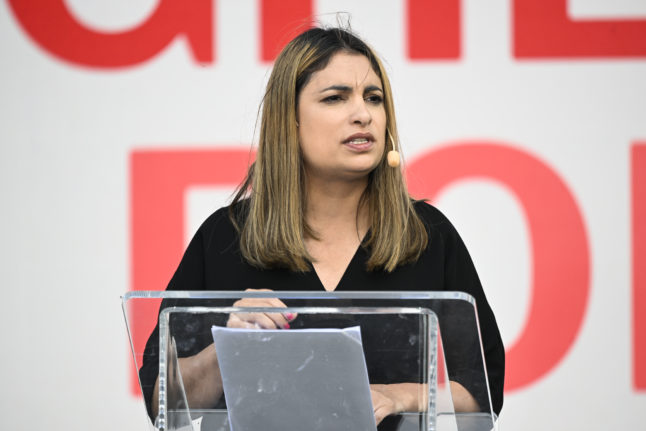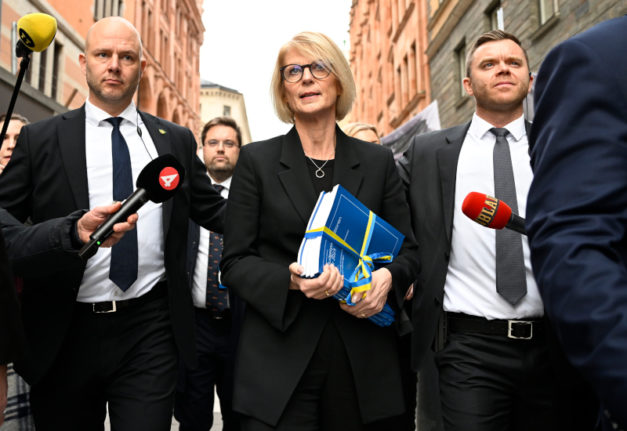“The Left Party, is going, with the right election result, to work together with the other parties on the left to take its place in the government, and shoulder the burden of responsibility,” Nooshi Dadgostar declared in her speech on the main stage at the Almedalen festival.
The deal to end profit-making at Swedish schools would have to be agreed before her party would be willing to let Magdalena Andersson, Sweden’s prime minister, take up her position again in a parliamentary vote.
“This should not be buried in some sort of [government] inquiry,” she declared. “This is something that we need to be agreed on before a vote on the prime minister.”
At a press conference earlier in the day, Dadgostar had announced a six-point plan to end profit-making in the Swedish school system.
The two new pledges, designed to show that her party could no longer be taken for granted, will cause headaches for the Social Democrats, as the Centre Party, their most likely coalition partner after the election, has over the past eight years refused to hold negotiations of any kind with the Left Party, let alone to rule alongside them in the same government.
The Centre Party is also opposed to banning companies operating state-funded schools in Sweden from withdrawing profits.
“Sometimes even the Centre Party has to make compromises,” Dadgostar told reporters.
In her speech, she reminded supporters of the major concessions her party has already extracted from the Social Democrats to win support in three recent parliamentary votes: 1,000 kronor a month for the poorest pensioners, the shelving of a plan to liberalise rents for new-build apartments, and a higher level of basic sickness benefits.
“Our party has changed,” she said. “You perhaps think that in the Left Party talk big, but don’t make anything happen. I understand.”
“Everyone,” she said, “has been too passive, including us. We trusted others too much. That was stupid. Today we are looking for a mandate to change Sweden for real.”
Elsewhere in her speech, Dadgostar looked back to a time when Sweden had “the best school system in the world”, crediting it for helping her start life in Sweden on an equal footing with everyone else, despite the poverty of her refugee parents.
But the decision to bring in a system of free schools, funded by the state but operated by profit-making private companies, she said, had destroyed Sweden’s schools, leading to schools with too few teachers, grade inflation, and increased segregation.
“Today we have a failed education system, which created worry and disorder,” she said. “The free-market school has splintered the togetherness we had in schools.”
She also sought to emphasise her respect for and pride in Swedish industry, part of her strategy to win over industrial workers who historically have voted for the Social Democrats.
“Sweden went from one of the Europe’s poorest countries to one of the world’s richest,” she said of the time of Gustav Möller, the Social Democrat with perhaps the best claim to have built Sweden’s welfare state. “The country was not mainly built up high, in the corridors of power, but in paper mills and steel works, it was built by truck drivers and shop assistants.”
It was this Sweden, she said, that the Left Party wanted to rebuild, she concluded.
“I am in the Left Party because I want to build a stronger Sweden. We know it can be done. People’s security is politicians’ responsibility. Your security is our responsibility.”
You can find the full speech here (in Swedish), and an English version (Google Translate) here.
The Local will as always cover the Swedish election from the point of view of international citizens living in Sweden. In our Sweden Elects newsletter, our editor Emma Löfgren will take a look every week at the issues that affect you; the biggest talking points; the whos, hows and whys; and several extra features just for paying members (you can find out HERE how to receive the newsletter to your inbox with everything included, and membership also gives you unlimited access to all of The Local’s articles).



 Please whitelist us to continue reading.
Please whitelist us to continue reading.
Member comments